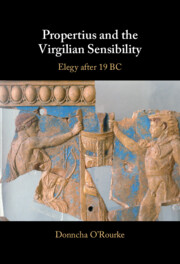Refine search
Actions for selected content:
7 results
Chapter 4 - The Shield of Propertius
-
- Book:
- Propertius and the Virgilian Sensibility
- Published online:
- 28 November 2024
- Print publication:
- 05 December 2024, pp 200-259
-
- Chapter
- Export citation
Chapter 2 - Rus in Urbe
-
- Book:
- Propertius and the Virgilian Sensibility
- Published online:
- 28 November 2024
- Print publication:
- 05 December 2024, pp 60-120
-
- Chapter
- Export citation

Propertius and the Virgilian Sensibility
- Elegy after 19 BC
-
- Published online:
- 28 November 2024
- Print publication:
- 05 December 2024
3 - Augustus, Apollo’s Lyre and the Harmony of the Principate
-
- Book:
- Music, Politics and Society in Ancient Rome
- Published online:
- 24 November 2022
- Print publication:
- 08 December 2022, pp 142-190
-
- Chapter
- Export citation
Chapter 5 - Money Quantity and Quality
-
- Book:
- Economic Theory and the Roman Monetary Economy
- Published online:
- 03 February 2020
- Print publication:
- 20 February 2020, pp 110-141
-
- Chapter
- Export citation
4 - The View from the East: Cleopatra and Mark Antony (38–31 BC)
-
- Book:
- From Caesar to Augustus (c. 49 BC–AD 14)
- Published online:
- 03 October 2018
- Print publication:
- 25 October 2018, pp 89-116
-
- Chapter
- Export citation
15 - Uncertainties
- from PART IV - THE AGE OF AUGUSTUS
-
-
- Book:
- The Cambridge History of Classical Literature
- Published online:
- 28 March 2008
- Print publication:
- 18 March 1982, pp 295-300
-
- Chapter
- Export citation
